President Joe Biden’s 2022 climate bill offers some attractive incentives for consumers: rebates of up to $8,000 for a heat-pump air conditioner and heater, $4,000 for an electrical panel, $2,500 for electrical wiring, and $1,750 for an electric heat pump water heater.
These benefits are coming to Illinois, with the state planning to start its home energy rebates in the first quarter of 2025, according to the Illinois Environmental Protection Agency (EPA).
The state also shared some important eligibility details: initially, these rebates will only be available to low-income households, defined as those earning less than 80% of the area median income. For the Chicago area, this means an individual earning less than about $62,800 or a family of four earning less than about $89,700.
The focus on low-income households is to comply with federal requirements and secure full funding, said the Illinois EPA. Illinois stands to receive up to $263 million under the federal climate bill, the Inflation Reduction Act.
People with moderate incomes, defined as earning 80% to less than 150% of the area median income, won’t qualify for the first round of rebates but might become eligible as the program expands. For the Chicago area, moderate income translates to less than about $117,750 for an individual and less than about $168,150 for a family of four.
Illinois plans to offer rebates for Energy Star-certified electric heat pumps for space heating and cooling, electrical panels, electrical wiring, and electric heat pump water heaters. Additionally, up to $1,600 will be available for insulation, air sealing, and mechanical ventilation products, and up to $840 for an Energy Star-certified electric heat pump clothes dryer and/or an electric stove, cooktop, range, or oven, according to the Illinois EPA.
The Inflation Reduction Act’s goal is to cut greenhouse gas emissions, which contribute to global warming. This is crucial as the world faces rising temperatures, melting glaciers, and extreme weather events like heatwaves, droughts, and floods.
The primary source of greenhouse gas emissions is the burning of fossil fuels. The Inflation Reduction Act provides incentives for businesses and individuals to switch to electricity, which can be produced from renewable sources like wind and solar.
Edgewater resident Maggie Bowman is looking forward to these rebates, hoping to replace her gas stove with an electric induction range. Bowman, who has asthma, wants to make this change for health and environmental reasons.
“When I saw that the rebates could be pretty sizable, I said, ‘Well, let me wait until those become available and see if I might qualify,’” said Bowman, who works for a nonprofit. Although she is not sure if she will meet the income requirements, she appreciates that Illinois is prioritizing low-income communities affected by pollution.
Also Read:
- Rockford Proposes Ticket Tax for Events Held at Hard Rock Live
- Illinois Expands Energy Assistance Program to Help More Low-Income Families
“I’m proud of the state for doing that,” she said. “Will it disappoint some people who were hoping they would qualify? Yeah, probably. But as long as all of the money that’s on the table is used in our state, which I’m sure it will be, I think it’s great.”







